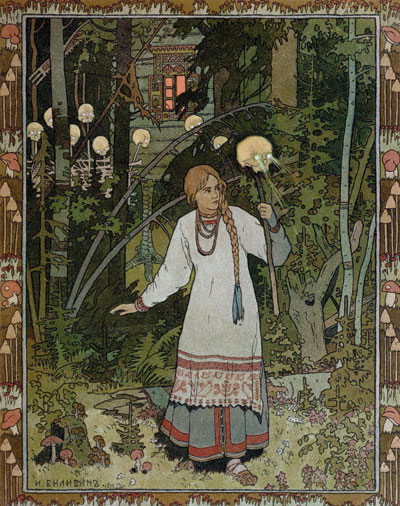For the English-speaking world, the book that more than any other defines the magic — or fairy — tale is Children’s and Household Tales by Jakob and Wilhelm Grimm, first published in Germany in 1812, and translated (or adapted: it was seriously toned down) into English by Edgar Taylor in 1823. For the Grimms, as for other Romantic writers, these traditional tales were the repository of an authentic, national culture, under dual threat from industrialisation and invasion by Napoleon’s France.
Educated Russian interest in folk traditions followed a similar trajectory: the first great Russian folklorist, Aleksandr Afanasyev, assembled his vast collection in the middle years of the 19th century. But if the Russian high culture of the time was closely connected to the rest of Europe, its folk traditions were not. St Petersburg, with its French-speaking salons and its Prussian-style bureaucracy, may have been built as a ‘window on the West’, but much of the rest of the country was (and is) at least as open to Asia as to Europe.
The tales in this wide-ranging anthology speak of a distinct culture, linked to our own via shared Indo-European origins, but with its own characters and characteristics — though some old friends (the wicked stepmother, that clever frog with the trick of mutating into a prince…) do make an appearance.
The magic tales here fall into two categories, each given roughly equal space: those transcribed, often verbatim, at traditional storytelling occasions by folklorists such as Afanasyev; and those composed in writing by ‘literary’ authors like Pushkin and Platonov, and imprinted with the individual sensibility of their creator.
The traditional folk tales are delightfully unsanitised. ‘In Pigskin’, a version of ‘Cinderella’, a beautiful girl escapes the clutches, not of two slave-driving older sisters, but of her lecherous father, who has fallen in lust with her after his wife’s death. In ‘The Frog Princess’, the hero enters a hut that stands on chicken legs, to find a Baba Yaga:
Her nose had grown into the ceiling and the snot from it was hanging across the threshold. She had slung her tits up over a hook and was sharpening her teeth.
Obviously children adore this kind of thing, but these stories were not intended as cosy bedtime reading. Rather, we should imagine the firelit camp deep in the spooky, frozen forest, with an invisible audience of listening spirits who might be provoked to terrible anger by the slightest narratorial faux pas. The Grimms, who yielded to commercial pressure to make their own tales more child-friendly, would surely have approved.
Pushkin was the first major Russian author to mine the folkloric tradition for his own creations, versifying tales he heard from Arina Rodionovna, a serf in his mother’s household. He was an extraordinarily mercurial writer; this quality, and his ability to create stories that are at once simple and rich in secondary, often satirical meanings, is suggested by the two very different pieces included here: ‘A Tale about a Priest and his Servant Balda’ and ‘A Tale about a Fisherman and a Fish’.
The other three individual authors, Nadezhda Teffi, Pavel Bazhov and Andrei Platonov, all wrote in the first half of the 20th century. Early Soviet propagandists claimed that fairytales had become reality, and this assertion has a measure of ironic truth, Stalin’s Russia being a place where lives could be transformed (or ended) with dizzying suddenness, and where frozen exile at the decree of a cruel tyrant was a literal, ever-present possibility for millions.
Teffi, a writer of genius who remains little known outside Russia, escaped to Paris after the revolution. In ‘A Little Fairytale’, a wonderfully clever and touching story, the figure of Baba Yaga becomes a poignant symbol of émigré dislocation and home-sickness. ‘The government even requisitioned my copper mortar,’ she laments. ‘If it weren’t for my broomstick I’d never have got away at all.’
Like the exiled Russian writers who drove taxis around Paris in the 1920s she has lost her powers, deprived of an audience who can understand what she has to say: ‘There isn’t even anyone I can have a good moan to… All this is going to be the end of me, it’s clear as daylight.’ The wider tragedy here is the unmooring, not just of individual lives, but of an entire culture.
This is a unique, beautifully edited book: an essential addition to the library of any Russophile. And the kids will love it…






Comments